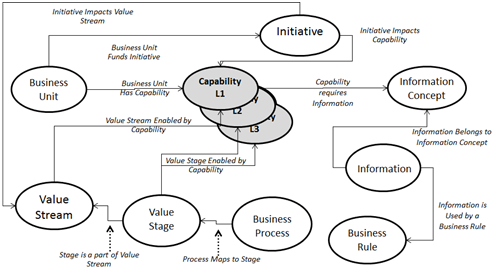Business architecture provides a sound foundation for capital planning based on business strategies and goals in any enterprise. Figure-1 depicts relationship between value business units, value streams and capabilities. However, applying these concepts for capital planning, when working with stakeholders, could be challenging. Stakeholders from IT operations, business operations andsales tend to have different priorities & objectives. Finding a balance between varied priorities is as much an art, as it is science.

Source: A Guide to the Business Architecture Body of Knowledge (BIZBOK™) – Release 3.0, Part 5
Figure 1 – Business Architecture Knowledge Base Mapping
IT leaders tend to focus on simplifying technology landscape and technology upgrade to reduce IT operational costs. Whereas, business operations leaders tend to focus on achieving quality & productivity goals. Sales leaders are worried about new features & functionalities required in products & services that they need to sell to customers. Value streams and capability maps are very helpful in facilitating discussions among stakeholders with varied objectives.
Let us take hypothetical example of a company that procures assets needed by customers for a fee. “Asset procurement management” is a capability supported by value stream stages viz., Identify Asset, Evaluate Asset, Evaluate Vendor, Structure Agreement, Receive Asset and Deploy Asset. Business processes associated with value stages will have specific in-year (and future) quality & productivity metrics. If the company has experienced M&A during its growth, there could be multiple redundant IT applications supporting “Asset procurement management”. Some of these IT applications could be on old technology stack that are badly in need of upgrade. IT operations may have desire to reduce redundancy and upgrade technology. Which means IT will have to identify strategic IT applications for future and develop a roadmap for future. At the same time, sales team requires new features and functionality to these applications in the near term to sell to new customers.
When ideating for capital programs, lot of good ideas for capital programs will come to the table. These ideas need to be evaluated using all of the aforementioned goals. It will be ideal if the outcome is a list of capital programs that satisfy all of these goals, but sometimes goals themselves could be conflicting. Therefore, it is important to identify key stakeholder who can arbitrate and approve conflicting goals.
Conclusion: Capability maps and value streams are valuable in capital planning exercise. In many instances, goals and objectives of key stakeholders may be conflicted. However, success of Business architect’s role in capital planning process lies in his/her ability to navigate through varied group of stakeholders. Finding a balance between varied priorities is as much an art, as it is science.
References
i Source: Business Architecture Guild
ii Source: Business architecture perspectives

















